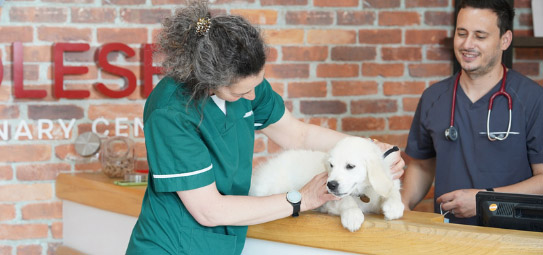
3 steps to preventing worms in dogs this spring
March 13, 2023
Spring is in the air and with the warmer and wetter weather parasites, like worms, become much more prevalent. With that in mind, we’re encouraging Molesey Vets clients to make sure their dogs are up to date with worming tablets and if their cover has lapsed, to make an appointment at our Park Road surgery. When you come in our nurses can advise you on the best products to keep worms at bay.
Follow our simple worm prevention checklist
Our head nurse has highlighted a simple three-step process to help you help your dog avoid worms. They have also put together a reminder, in the form of a simple PDF poster, for you to download, print, share & keep. Follow Molesey Vets simple advice and you’ll stand a very good chance of saving your dog a lot of worm-based hassle.
1. Prevent – Make sure you worm your dog regularly
This is the most effective way to protect your pet, but you must use medication that is appropriate for your dog. Never share wormers between dogs as they are pet specific.
2. Check – Know the signs of worms and check your dog regularly
Download our PDF to get all the details. Our Head Nurse at Molesey Vets has also added a few pointers at the end of this article.
3. Avoid – Avoid common ways that worms are contracted
Things like dog faeces, fleas, slugs & snails, and dead host animals can all carry parasitic worms. Help your dog avoid these and you’ll minimise the chances of them contracting a worm infestation.
Know the signs of worms and act early
We’d encourage any dog owner to make themselves familiar with the signs of worm infestations. Below, we have listed the main types of worms we tend to see at Molesey Vets along with the symptoms one might expect to see with each.
- Tapeworms: You may notice individual segments of these flat worms that look like grains of rice in your dog’s faeces or on their anus, ‘scooting’ their bottom on the ground, and weight loss.
- Hookworms: Pale gums, anaemia, weight loss, weakness, bloody diarrhoea, itchy paws, poor growth – can be fatal.
- Roundworms: Rice or spaghetti-like worms in faeces, vomiting, diarrhoea, swollen and painful belly, weakness, dull coat, and weight loss.
- Whipworms: Diarrhoea, bloody stools, anaemia, and weight loss.
- Lungworm: Weight loss, difficulty breathing, coughing (with blood), lethargy, unexplained bruising and bleeding, seizures, collapse, shock, blindness – can be fatal.
If you see or suspect your pet has any of these, we suggest you call us for advice and to book an appointment.



